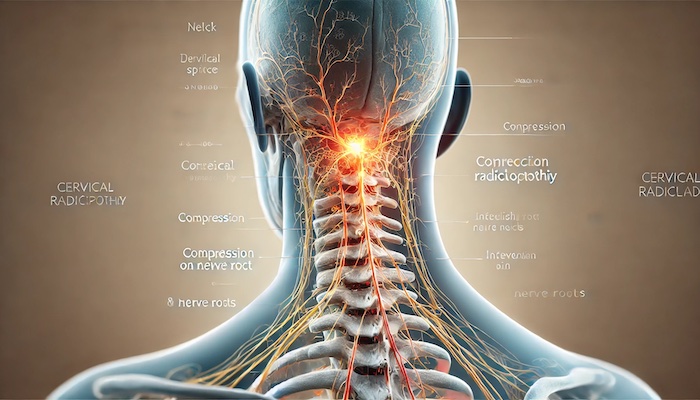
Cervical radiculopathy, commonly referred to as a "pinched nerve" in the neck, is a condition that causes pain and discomfort originating from the cervical spine (neck area) and radiates down through the shoulders, arms, and hands. This pain results from compression or irritation of one or more nerves in the cervical spine, often due to herniated discs, degenerative disc disease, or other spinal issues.
Symptoms and Causes of Cervical Radiculopathy
People with cervical radiculopathy often report neck pain that radiates to the shoulder, arm, or hand on one side of the body. Alongside pain, common symptoms may include tingling, numbness, or weakness in these areas. When nerves in the cervical spine are compressed, they disrupt the signals between the brain and the muscles, resulting in these discomforts.
Several causes may lead to cervical radiculopathy:
- Herniated Disc: This occurs when the soft material within the disc leaks out and presses against a nearby nerve.
- Degenerative Disc Disease: Age-related wear and tear can narrow the disc space, putting pressure on the nerves.
- Bone Spurs: Bony growths, often the result of arthritis, can form on the vertebrae and press against nerves.
- Injury or Trauma: Accidents or sports injuries can lead to immediate or delayed symptoms by putting pressure on cervical nerves.
Diagnosing Cervical Radiculopathy
Diagnosing cervical radiculopathy involves a combination of physical examinations, medical history reviews, and imaging studies. Physicians may conduct tests like MRIs, CT scans, or X-rays to locate the exact area of nerve compression and identify the underlying cause. Electromyography (EMG) tests may also be performed to assess nerve function and measure electrical activity, ensuring an accurate diagnosis.
Interventional Pain Management for Cervical Radiculopathy
For many individuals suffering from cervical radiculopathy, interventional pain management offers a minimally invasive approach to pain relief. By focusing on targeted treatments and advanced techniques, interventional pain management addresses the root cause of pain while minimizing the need for more invasive surgical options. Some key interventional techniques for managing cervical radiculopathy include:
- Epidural Steroid Injections: This procedure involves injecting a corticosteroid medication directly into the epidural space around the irritated nerve roots. The steroid helps reduce inflammation, providing relief from pain and other symptoms.
- Nerve Blocks: A nerve block involves injecting an anesthetic or anti-inflammatory agent near the affected nerve, which can reduce or eliminate pain in the targeted area.
- Radiofrequency Ablation (RFA): For those with persistent symptoms, RFA can provide long-term relief by using heat to disrupt nerve fibers that transmit pain signals from the spine to the brain. This technique can alleviate pain for months, allowing patients to resume normal activities.
- Physical Therapy and Rehabilitation: An essential component of interventional pain management, physical therapy helps strengthen muscles around the spine, improve posture, and reduce the likelihood of further nerve compression. It is often combined with other interventions to help patients regain function and mobility.
- Minimally Invasive Spinal Decompression: For patients whose symptoms stem from structural issues, decompression techniques can relieve pressure on the affected nerves, improving pain and mobility.
Success Rates and Patient Outcomes
Interventional pain management has shown promising results in alleviating symptoms of cervical radiculopathy. According to clinical studies, patients who receive epidural steroid injections often experience pain relief for weeks to months, which can provide enough time for natural healing to occur in the spine. Studies also indicate that radiofrequency ablation can relieve chronic pain for six months or longer in some patients, offering them an effective alternative to surgery.
Benefits of Interventional Pain Management
Interventional pain management provides several benefits:
- Minimally Invasive: Procedures are performed with smaller incisions, reducing recovery time.
- Reduced Reliance on Medications: These techniques can reduce the need for daily pain medications by addressing pain at its source.
- Enhanced Quality of Life: Improved pain levels and functionality allow individuals to return to work, hobbies, and other activities.
- Avoidance of Surgery: For many, these techniques can offer relief without the need for surgical intervention.
Living with Cervical Radiculopathy
With advances in interventional pain management, patients with cervical radiculopathy can achieve significant relief and regain control of their lives. By combining innovative pain management techniques with physical therapy, patients often experience improved function, less pain, and enhanced quality of life.
Precision Pain Care and Rehabilitation has two convenient locations in Richmond Hill – Queens, and New Hyde Park – Long Island. Call the Queens office at (718) 215-1888 or (516) 419-4480 for the Long Island office to arrange an appointment with our Interventional Pain Management Specialists, Dr. Jeffrey Chacko or Dr. Sonny Ahluwalia.















